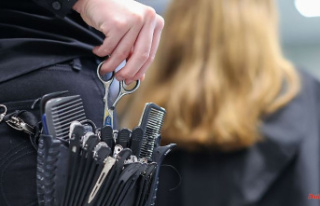High spending on energy and food - many hairdressers worry that less money will soon be spent on the trendy haircut. But business is still going.
Erfurt (dpa/th) - Before Christmas and New Year's Eve, many Thuringian hairdressers are booming and appointment books are full. For the time after that, however, the craft businesses feared a significant drop in sales. "We are afraid of the situation in January and February," says master hairdresser Ilona Böttcher from Meiningen. It is already noticeable that for many customers the intervals between visits to the hairdresser are becoming longer. During the Corona lockdown, some people switched to cutting or coloring their own hair and have saved themselves the services of professionals to this day.
In many hairdressing salons, concerns about the future are spreading in view of the financial burdens that not only customers have due to the high inflation, according to the industry. "In the next six months, many hairdressers and beauticians will be in trouble," fears Sven Heubel, head of the state guild for hairdressers and beauticians in Thuringia/Saxony-Anhalt. Visiting beauticians and nail salons in particular is a luxury that, according to experience, is one of the first cost-saving measures taken by customers.
In surveys, the companies stated that they were facing a very tense economic situation given the combination of inflation, rising commodity and energy prices, minimum wage and index rents, which are linked to the rate of inflation. "Actually, after the Corona crisis, we would have needed a year of normal operation to stabilize ourselves economically," says the state guild master.
The Thuringian hairdressers and beauticians are currently making around a third less sales than before the corona pandemic. In the course of the current developments, the state guild master also fears a significant increase in undeclared work. He appealed to customers and hairdressers to refrain from such offers.
The introduction of the energy price brake in the coming year gives a little hope, according to Heubel. In addition, there must also be government aid and funding programs as quickly as possible. "The most important thing for the industry would be a sales tax reduction to seven percent, as in the catering industry."
But there must also be changes within the industry. Exemptions for the operation of a hairdressing salon should be handled much more strictly in the future. Currently, it is enough to employ a master or experienced hairdresser on paper to open your own salon - that invites abuse. Especially in the case of the "barbershops" that are burgeoning everywhere, the quality and specialist knowledge are not particularly high, according to the state guild master. "We need qualified people with degrees who offer customers quality and more than just three standard haircuts," says master hairdresser Böttcher.
Men in particular often switch to the cheaper alternative, reports Anett Vollborth from Nordhausen. Colleagues specializing in men's haircuts felt this trend more strongly. However, the master hairdresser with six employees and three apprentices does not share the general concerns of the industry: "The situation and the prospects are currently quite good for us." In order to meet the challenges, well-trodden paths would have to be left.
The woman from Nordhausen was awarded the Future Prize by the Erfurt Chamber of Crafts in 2018 for her ideas for recruiting skilled workers. It is becoming increasingly difficult for many hairdressing companies to recruit young people. Because the profession, which was long considered the dream job of many young people, is chosen less and less, according to figures from the Thuringian Crafts Day. While 153 young people completed a training contract as hairdressers in 2018, there were only 93 in 2020. At this low level, the number of hairdresser trainees has stabilized at 94 this year, according to a spokeswoman.












